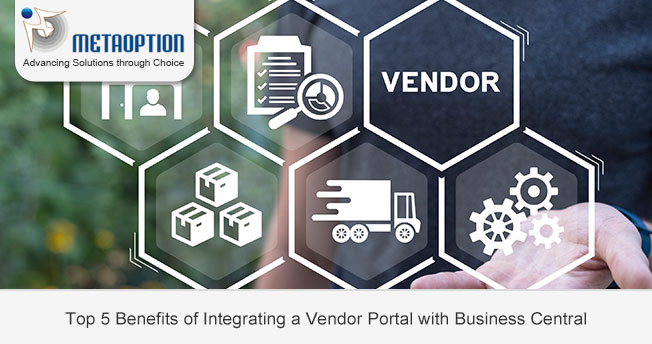In today’s fast-paced business environment, efficiency and streamlined workflows are critical to maintaining a competitive edge. For organizations using Microsoft Dynamics 365 Business Central, integrating a vendor portal can be a game-changer in managing business workflows and fostering stronger vendor relationships. In this blog post, we’ll explore the benefits of integrating a Vendor Portal with Business Central and how it can revolutionize your business processes.

What is Microsoft Dynamics 365 Business Central?
Microsoft Dynamics 365 Business Central is an all-in-one business management solution for small and medium-sized businesses. It automates and streamlines business processes across finance, operations, sales, and customer service, allowing for seamless data flow and better decision-making.
The Need for a Vendor Portal
Managing vendor relationships and procurement processes efficiently can be challenging without the right tools. Traditional methods, like email and phone calls, often lead to delays, miscommunications, and a lack of transparency. A vendor portal integrated with Business Central can address these issues by providing a centralized platform for vendors to interact with your business, leading to improved communication, faster transactions, and better workflow management.
Benefits of Integrating a Vendor Portal with Business Central
1. Enhanced Communication and Collaboration
A vendor portal provides a unified communication channel between your organization and vendors. It enables real-time information sharing, reduces the dependency on emails, and minimizes the risk of miscommunication. Vendors can easily access purchase orders, submit invoices, and check the status of their payments, fostering better collaboration and transparency.
2. Automated Workflow Management
Integrating a vendor portal with Business Central automates various workflows, from purchase requisitions to invoice approvals. Automated workflows reduce manual intervention, minimize errors, and ensure that procurement processes are consistent and efficient. This automation allows your procurement team to focus on more strategic tasks rather than getting bogged down by routine administrative work.
3. Improved Data Accuracy
Manual data entry is prone to errors, leading to discrepancies between vendor records and transaction history. A vendor portal makes data synchronization between vendors and your Business Central system seamless. Vendors can directly input their information, reducing the chances of errors and ensuring that your records are always accurate and up-to-date.
4. Streamlined Procurement Process
A vendor portal streamlines the entire procurement process, from issuing requests for quotations (RFQs) to receiving goods and making payments. Vendors can respond to RFQs, submit quotes, and negotiate terms through the portal, leading to quicker turnaround times and more competitive pricing. This streamlined process enhances procurement efficiency and helps in maintaining optimal inventory levels.
5. Better Vendor Performance Management
Business Central’s integration with a vendor portal allows you to monitor vendor performance more effectively. You can track metrics such as delivery times, order accuracy, and compliance with contract terms. This data helps in making informed decisions about vendor relationships and in identifying areas for improvement or renegotiation.
6. Reduced Costs and Increased Efficiency
By automating workflows and reducing the need for manual intervention, integrating a vendor portal with Business Central helps in cutting down operational costs. It minimizes paperwork, accelerates transaction processing, and reduces the time spent on resolving discrepancies. The increased efficiency translates into cost savings and improved bottom-line performance.
Key Features of a Vendor Portal Integrated with Business Central
1. Self-Service Capabilities
Vendors can manage their profiles, view purchase orders, submit invoices, and track payments through the portal, reducing the administrative burden on your procurement team.
2. Real-Time Data Access
The integration ensures that vendors have access to real-time data related to their transactions, enabling them to make informed decisions and respond quickly to any issues.
3. Document Management
The portal allows for easy uploading, sharing, and management of essential documents such as contracts, purchase orders, and invoices. This feature helps in maintaining an organized and easily accessible record of all vendor interactions.
4. Approval Workflows
Automated approval workflows ensure that purchase orders and invoices are reviewed and approved promptly, minimizing delays in the procurement process.
5. Alerts and Notifications
The system can send automated alerts and notifications to both vendors and your team, keeping everyone informed about critical updates, upcoming deadlines, and any actions required.
Implementing a Vendor Portal: Best Practices
1. Choose the Right Vendor Portal Solution
Select a vendor portal that is compatible with Business Central and meets your business needs. Consider factors such as ease of use, integration capabilities, and the ability to customize workflows.
2. Involve Key Stakeholders
Ensure that key stakeholders, including your procurement team, IT department, and vendors, are involved in the implementation process. Their input and feedback will be crucial for successful integration.
3. Provide Training and Support
Offer comprehensive training to your team and vendors on how to use the portal effectively. Provide ongoing support to address any issues and ensure a smooth transition.
4. Monitor and Optimize
Regularly monitor the performance of the vendor portal and gather feedback from users. Use this information to optimize workflows, enhance features, and address any challenges.
Winding Up
Integrating a vendor portal with Business Central offers benefits, from enhanced communication and streamlined workflows to improved data accuracy and cost savings. It transforms the way you manage vendor relationships and procurement processes, making your business more agile and efficient. By adopting this integrated solution, you position your organization for sustained growth and success in an increasingly competitive market.
Ready to streamline your business workflows with a vendor portal integrated with Business Central?
For more information and a tailored demonstration contact us today at MetaOption LLC.


